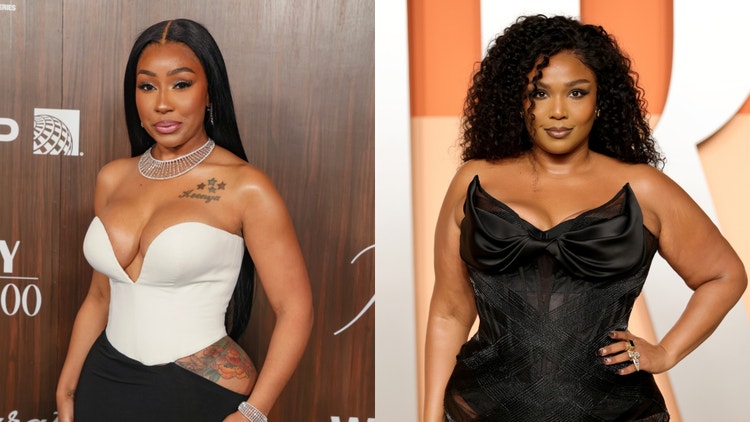Body Image Battles: Yung Miami and Lizzo Confront Society’s Impossible Standards
In the music and celebrity culture, few topics spark as much controversy and conversation as body image. Recently, two powerhouse artists, Yung Miami and Lizzo, found themselves at the center of this ongoing dialogue, shedding light on the relentless scrutiny women face in the public eye.
The Confrontation
On a Saturday night Twitch livestream, Lizzo took an unexpected step by directly addressing comments made by Yung Miami on the “Club Shay Shay” podcast. This bold move highlighted the complex relationship between female artists, their bodies, and public perception. Lizzo’s decision to confront the issue head-on demonstrated her commitment to challenging societal norms and fostering open dialogue. This is especially relevant in the age of social media, where Lizzo’s body image scrutiny is amplified.
During the livestream, Lizzo asked Yung Miami about her use of the word “ew” in reference to her body. This moment of vulnerability allowed both artists to discuss the nuances of body image and the constant pressure to meet ever-changing beauty standards. Yung Miami clarified her stance, emphasizing that her comments were meant to illustrate the impossible situation women face, regardless of their body type.
The Double-Edged Sword of Body Image
Yung Miami’s original comments on the “Club Shay Shay” podcast highlighted the lose-lose situation many women, especially in the entertainment industry, find themselves in. She pointed out the contradictory expectations placed on women’s bodies:
“When you have a natural body, you look like a little boy you got no sex appeal. When you do get a BBL it’s like oh my god your body fake. It’s like if you natural they hate you, if you get a BBL they hate you.”
This statement encapsulates the frustration felt by many women who face criticism regardless of their choices. It’s a sentiment that resonates not only with celebrities but with women from all walks of life who struggle with body image and societal expectations. The pressures of maintaining an ideal body image can lead to mental health conditions.
Lizzo’s Public Scrutiny
Lizzo’s weight loss journey, which began in September 2024, has been a subject of intense public interest. The artist has been open about her fitness journey, sharing workout videos and shutting down rumors about using weight loss drugs or undergoing surgery. Despite her efforts to promote health and self-love, Lizzo continues to face scrutiny and criticism from all sides. The media plays a significant role in perpetuating unrealistic beauty standards, contributing to Lizzo’s body image scrutiny.
The conversation between Lizzo and Yung Miami highlighted the exhausting nature of constant public commentary on women’s bodies. Lizzo’s statement, “It’s never enough,” encapsulates the frustration of trying to meet ever-shifting standards of beauty and acceptability.
A Broader Issue in the Music Industry
The discussion between Lizzo and Yung Miami is just the tip of the iceberg when it comes to body image issues in the music industry. Artists like Ice Spice, GloRilla, Nicki Minaj, Cardi B, Megan Thee Stallion, and Coi Leray have all faced their share of body-shaming and misogynistic comments. These experiences range from criticism about being “too skinny” or “too fat” to invasive comments about post-pregnancy bodies and aging.
The Impact of Social Media
Social media platforms have amplified the body image debate, creating an environment where every physical change is scrutinized and commented upon. This constant exposure to public opinion can have severe psychological effects on artists and fans alike. The conversation between Lizzo and Yung Miami serves as a reminder of the need for more empathy and understanding in online discourse. The impact of social media is a key factor in understanding Lizzo’s body image scrutiny
Challenging Beauty Standards
The frank discussion between Lizzo and Yung Miami represents a step towards more open and honest conversations about body image in the music industry. By addressing these issues directly, these artists are challenging long-standing beauty standards and paving the way for greater acceptance and diversity in body types.
As the music industry continues to evolve, it’s crucial that we support artists who use their platforms to promote body positivity and self-acceptance. The courage shown by Lizzo in confronting this issue head-on and Yung Miami’s willingness to engage in dialogue sets an example for how we can address these sensitive topics with honesty and respect.
Ultimately, the conversation between Lizzo and Yung Miami is a powerful reminder that behind every headline and social media post is a real person dealing with real pressures and insecurities. As music fans and consumers, we can shape the narrative by promoting positivity and rejecting harmful beauty standards. Doing so can create a more inclusive and supportive environment for artists and fans alike.




